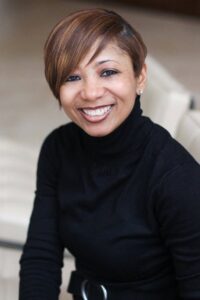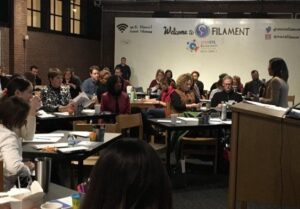Sherita Haigler is the Director of the St. Louis Regional STEM Learning Ecosystem. Official job title: Catalyst! Learn more about the work of STEMSTL here.
What drew you to work in the STEM education field?
At this stage in my life and career, I wanted to do something meaningful that would have an impact in my community. What a better way than having a positive impact on shaping children’s learning experiences and giving them access to STEM learning opportunities? I’m on the board of University City Children’s Center and a part of its Mission, Vision, Beliefs statement says, “What happens early in life lasts a lifetime, and the power to change society lies in transforming the way young children are taught.” I believe that’s true; we have to teach children in a way that allows them to use critical thinking, problem-solving, relationship-building, and leadership skills. STEM learning is a great way to do that, and it gives them a pathway to potential career opportunities down the road.
What are you working on for the future for St. Louis Regional STEM Learning Ecosystem (STEMSTL)?
Right now, I’m working on:
- Ensuring we have the right mix of partners/stakeholders represented across the sectors.
- Building awareness for STEMSTL within the St. Louis Region.
- Leading conversations and action regarding creating our mission, vision, guiding design principles, governance structure and goals via our Design Studios.
- Building the Foundation of what we want the Ecosystem to look like and how it will be a positive impact and win/win for all involved.

How are Ecosystems helping meet demand for STEM jobs? Or addressing equity in education?
Ecosystems are helping solve the employment gap by bringing together key stakeholders in the education realm and business community to discuss skills gaps and create action plans to fill those. As it relates to addressing equity and diversity in education, Ecosystems are using data to understand where needs are and building action plans on how to close the equity gap. We recognize the need for an intentional focus on understanding inequities and lack of diverse educational opportunities. There isn’t a one-size-fits-all scenario; we must determine how to meet individuals where they are and build from there.
Do you have a mentor? Who and how?
Yes, I have mentors in every aspect of my life, from personal development to spiritual development to professional development. For me, it’s important to have different perspectives in different areas and stages in my life. One of my mentors is a Sorority Sister Valerie Patton, she is straightforward and tells it like it is – and she does it with love. She knows when to lean in, and she knows when to give space for reflection. I can always count on her to be there for sound advice.
Who was a role model for you when you were younger?

My mother and grandmother. They always gave me the encouragement I needed to be my best. While neither of them went to college, they always encouraged me to pursue and obtain my degree. They always had a can-do attitude. My mother still encourages me in my adult years. My grandmother is in heaven now, but I always feel her presence with me, telling me, “I can do all things through Christ who strengthens me.” These two ladies have been my role models and my cheerleaders and for that, I am forever grateful.
My favorite teacher was my kindergarten teacher (Ms. George White); she helped to lay the foundation for my early learning. She made learning fun because of the interaction she had with all the students. She also kept in contact with me throughout my educational career. She’s the person that made me want to pledge Delta Sigma Theta sorority because of the way she carried herself and represented core values of the Sorority. She had and still has a certain way of engaging you. She’s one of my “Sheroes!”

